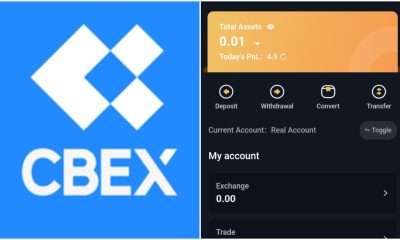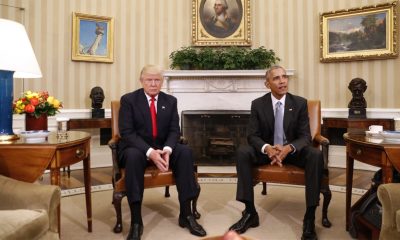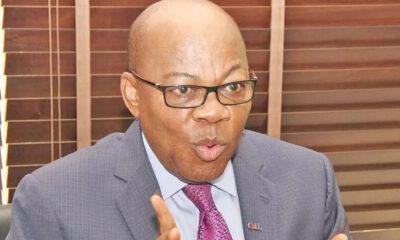The Central Bank of Nigeria (CBN)’s security borrowing from JP Morgan and Goldman Sachs could set Nigeria’s credit rating on a free fall to junk amid efforts to reposition the economy.
The apex bank, in its newly released 2022 financials, reported borrowing $7.5 billion from U.S banks JP Morgan and Goldman Sachs by pledging securities.
Analysts say that the loan deal, which the central bank said was contracted “in exchange for its securities to be held for collateral”, may impair the nation’s fragile fiscal position and credit rating.
The CBN also disclosed that it entered into 30-day forward contracts totalling 3.15 trillion naira in 2022 with undisclosed counterparties.
Sylvester Anaba, an analyst at a Lagos investment house, said there won’t be severe consequences as much as CBN can pay back its debt to these foreign creditors.
“But if they default, then investors will begin to dump our bond. It will also impact our credit rating,” he said.
“Recently, they brought up some ratings and Nigeria was maintained at B-, about six notches down to junk rating. It means by the time CBN defaults; there is nothing that will save us from entering junk.”
READ ALSO:
The apex bank disclosure on borrowings of $7 billion and $500 million, respectively, from JP Morgan and Goldman Sachs leaves fragile investor confidence in Nigeria in danger of fresh harm after President Bola Tinubu’s host of currency reforms and termination of a regime of costly fuel subsidies that are already winning international investors back.
Rating agency Fitch last November downgraded Nigeria’s Long-Term Foreign-Currency Issuer Default Rating (IDR) to ‘B-’ from ‘B’, citing “deterioration in Nigeria’s government debt servicing costs and external liquidity despite high oil prices.”
Moody’s earlier verdict
A verdict by New York-based Moody’s Investors Service early this year similarly cut Nigeria’s ratings to non-investment grade in danger to its prospects of sourcing debt from the international capital market.
The then Minister of Finance, Zainab Ahmed, rejected Moody’s position.
“But these are external rating agencies that don’t have the full understanding of what is happening in our domestic environment,” she said in a retort.
S&P Global Ratings
Against the backdrop of recent reforms, S&P Global Ratings earlier in August revised its outlook on Nigeria to stable from negative.
“Nigeria’s newly elected government has moved quickly to implement a series of fiscal and monetary reforms, which we believe will gradually benefit public finances and the balance of payments,” the rating agency said in a statement.
Analysts are worried that the various revelations from the newly released CBN financial reports may reverse the gains of recent months.
An exposure that high without documentation in the country’s public debt books is an early setback to recent measures like the unification of Nigeria’s multiple exchange rates, aimed at stabilising the naira.
Nigeria’s dollar bond due in 2030 sank 2.295 cents to its lowest level in the past one month on Friday at 83.221 cents as a crisis of confidence in the economy heightened among investors.
“We are currently grappling with a confidence crisis in the forex market. This may further worsen the confidence problem. It could aggravate speculative activities,” said Muda Yusuf, the chief executive of the Centre for the Promotion of Private Enterprise.
“Rating agencies are going to begin to revise our ratings. You know what that will do to our reputation as a country,” Dr Yusuf further said.
More Irregularities
CBN books for 2022 showed that $3.2 billion is owed to an unnamed party as foreign currency forward contract payables—no notes providing clarity on the transaction accompanying that item.
READ ALSO:
“Since the loans from JP Morgan and Goldman Sachs etc., are collateralised with Nigeria’s foreign assets (securities), then the current gross external reserves of about $30 billion becomes $16.3 billion net,” a prominent economist who sought anonymity told PREMIUM TIMES.
“If the other outstanding obligations are included, CBN is technically insolvent,” he added, noting that the exchange rate is likely to depreciate further.
The analyst remarked that the low levels of the real reserves has encumbered the apex bank’s intervention in the currency market.
The current state of the reserves means investors will rather accept the exchange rate as it is at the moment on the knowledge that the reserves could run dry soon.
“The rush to the exit door will create an fx market stampede,” the analyst said.
The decision of international investors in 2021 to quit the open market operation (OMO) bills denominated in dollars was set to strain the reserves with foreign investment in the bills already at $17 billion a year earlier.
According to the analyst, “it was at this point that CBN took collateralised loans from these banks.”
The immediate past president, the CBN board and the National Assembly failed to bring Godwin Emefiele, the apex bank’s governor, to book in a mark of failure of oversight, making them culpable, he added.
“While they do not have to approve CBN transactions, they did not sanction the Governor for not publishing and gazetting Annual Reports, which would have exposed the scam.
“The entities that lent money to CBN have violated an important international norm: If the law of a country requires published audited accounts, they broke the law by lending to an entity that did not meet the law,” the analyst affirmed.
“The IMF should be asked questions: CBN was given IMF advances in 2020, what Annual Report formed the basis? What safeguards took place before the money was advanced? “Why has IMF Annual Reports since 2016 not pointed out these issues? Can IMF be relied upon as a credible and impartial organisation?” he said.
Opacity
Last year, Premium Times raised concerns over the failure of the apex bank to publish its financial reportsin gross contravention of extant laws.
For years, the Central Bank of Nigeria (CBN) repeatedly failed to release its annual reports showing details of its operations and financial obligations.
Since 2005 when it started publishing details of its annual report on its website, the CBN never failed to publish the report until it stopped the publication of the crucial documents shortly after the Muhammadu Buhari government came to power.
According to the CBN Act 2007, the apex bank is expected to publish its report within two months after the end of each financial year.
“The Bank shall, within two months after the close of each financial year, transmit to the National Assembly and the President a copy of its annual accounts certified by the Auditor,” the CBN Act reads in part.
“A report required to be submitted to the National Assembly and the President shall be published by the Bank in such manner as the Governor may direct.
“The Board shall ensure that accounts submitted pursuant to this section shall, as soon as possible be published in the Gazette.
“The Bank shall, as soon as may be practicable after the last day of each month makeup end, publish a return of its assets and liabilities as at the close of business on that day, or if that day is a holiday, as at the close of business on the last preceding business day,” the Act reads.
Analysts said the failure of the CBN to publish the report sent wrong signals to investors and others interested in understanding the state of the economy and concealed Nigeria’s fiscal problems for far too long. (Premium Times)



























